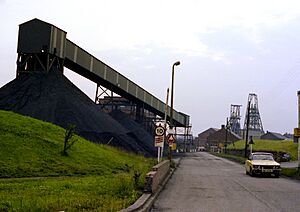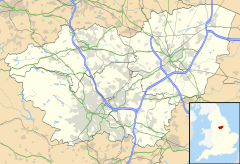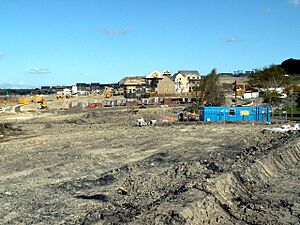Woolley Colliery facts for kids
Quick facts for kids Woolley Colliery
|
|
|---|---|
 Woolley Colliery, pictured in 1979 |
|
| OS grid reference | SE319132 |
| Metropolitan borough |
|
| Metropolitan county | |
| Region | |
| Country | England |
| Sovereign state | United Kingdom |
| Post town | BARNSLEY |
| Postcode district | S75 |
| Dialling code | 01226 |
| Police | South Yorkshire |
| Fire | South Yorkshire |
| Ambulance | Yorkshire |
| EU Parliament | Yorkshire and the Humber |
| UK Parliament |
|
Woolley Colliery is a small village located in the Wakefield district of West Yorkshire, England. It sits close to the border with South Yorkshire. The village is often called "Mucky Woolley" by local people. This nickname honors its history of coal mining. It also helps tell it apart from another village called Woolley, which is about two miles away.
Contents
A Village Built on Coal
People started digging for coal in this area as early as 1850. Around that time, the village of Woolley Colliery began to grow. Two rows of small houses were built. These homes were for the miners and their families.
Coal had probably been dug here for many years before. But it was only on a small scale. When railway transport became available, coal mining grew much bigger. The main coal mine, Woolley Colliery, was officially started in 1869.
How the Mine Worked
The Woolley Colliery mine had three main shafts, which are like deep tunnels going straight down. Miners dug coal from three different layers of coal, called seams. These seams were named Fenton, Lidgett, and Thorncliffe. The mine also had five coal faces, which are the areas where miners actually cut the coal.
In 1947, the mine became "nationalised." This means the government took ownership of it. Most of the coal dug from Woolley Colliery was used to make electricity. Some was also used to make coke, a special fuel.
Woolley Colliery grew to be one of the biggest mines in West Yorkshire. By 1980, it employed many people. There were 1,514 men working underground. Another 428 men worked on the surface.
Getting the Coal Out
The colliery first started with two tunnels, called drifts, dug into a coal seam on the hillside. Later, tall shafts were dug deeper into the ground. These shafts helped reach the coal seams that were further down.
In the 1960s, there were three shafts in the main mine yard. A fourth shaft, used for fresh air, was about a mile to the east. At that time, the mine produced a lot of coal. About 17,000 tons of high-quality coal were dug each week!
A Famous Miner: Arthur Scargill
Arthur Scargill started working at Woolley Colliery in 1953. He was only 15 years old then. He later became a very important leader. He led the NUM, which was a union for miners.
Woolley Colliery was known for being quite traditional. Arthur Scargill often had disagreements with the local union leaders. For example, in 1960, he organized a strike. This strike was about when union meetings were held. He believed the meetings were set at times when some workers couldn't attend.
The Big Strike of 1984-85
During the UK miners' strike of 1984–1985, many miners at Woolley Colliery went on strike. About 70 percent of the workers stopped working for a whole year. However, the local union leaders were careful about how they used union money. They were also careful about using "flying pickets," which are groups of strikers who go to other workplaces to encourage more people to join the strike.
There were some disagreements with another nearby mine, North Gawber Colliery. They argued about how much each mine should contribute to feeding the striking miners. After the strike ended, the miners from North Gawber were moved to work at Woolley Colliery.
From Mine to Homes: Woolley Grange
The Woolley Colliery mine closed down in 1987. The old mine buildings were taken down in 1993. Today, the land where the mine once stood is a private housing estate called Woolley Grange.
Protecting Wildlife at Woolley Grange
In 2023, there were plans to build even more houses on the old mine site. However, local people and nature experts were against these plans. They worried that new buildings would change the local area too much. They also worried about the wildlife.
The proposed building site was home to a special type of butterfly called the small blue butterfly. This butterfly colony lived in the natural habitat there. The new building plans would have left very little of this natural area. Only the SUDS (a system for managing rainwater) would have remained undeveloped.
 | Precious Adams |
 | Lauren Anderson |
 | Janet Collins |



